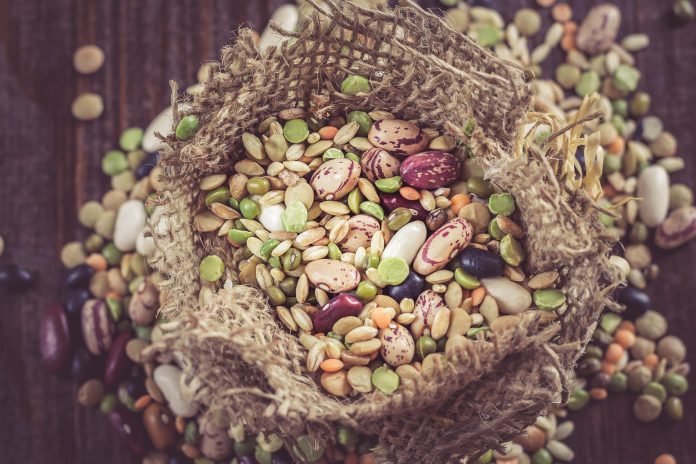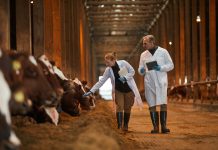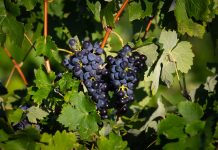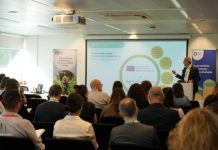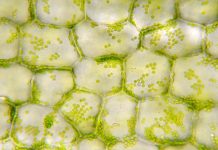Roger Vickers, CEO of the Processors and Growers Research Organisation explains the LegValue project and how in the world of agriculture, legumes contribute to a better world
Pulses the dried grains of legume crops, bring together a large diversity of well-known species: Pea, fababean, bean, lupin, chickpea and lentil. Soya is also a legume which stands out for its oil content. Most pulses were cultivated in Europe for centuries as the main protein source, but a dramatic decline of their cultivation began when intensive farming was encouraged in the 20th century.
Adopting systems based around legume production would enable the European Union (EU) to produce more plant protein. More legumes would reduce the reliance upon imports, simultaneously increasing EU food security (transition in food), reducing land-use change and greenhouse gas emissions (transition in environment) and increase the sustainability of EU agricultural production (transition in agriculture). LegValue aims to emphasise the contribution of legumes to the interdependence between these transitions.
Major outcomes of LegValue and its potential contribution
The goal of LegValue is to pave the road to the development of sustainable and competitive legume-based farming systems in the EU. LegValue assesses the economic and environmental benefits of agricultural value chains based on the widespread use of legumes produced sustainably.
The LegValue approach overcomes the gap between stakeholder-driven objectives and bridges research and practice by utilising close collaboration between industry and scientists.
The project will produce the first decision tool enabling farmers to choose the optimal legume species adapted to their crop management and assess the economic and environmental benefits of legumes in their cropping systems. Accurate recommendations will be provided for the development of legumes in the EU by removing the current market opacity and design of transition pathways – routes to change. LegValue will deliver scientific support for EU and national policy-makers, directed at increasing pulse production, supporting technological and organisational innovation in supply chains.
Transition in agriculture: Generalisation of agroecology
Agroecology applies principles of natural ecology systems to agricultural production. Over the last 60-70 years, European industrial agriculture systems have diverged from environmental considerations in the pursuit of yield and profit concentrated in a few crops. Driven by the use of cheap energy, low-cost synthetic fertilisers and agrochemicals, this system is failing by disrupting the ecological balance of nature. Pests and diseases are becoming uncontrollable, yields are stagnating or declining and ecosystems are collapsing. There is a need for a more sympathetic way of farming. Legumes placed at the heart of a cropping system offer the opportunity for that change. The LegValue project has set out to demonstrate how this can be achieved.
Transition in the environment: Set up production and consumption systems resilient in the face of climate change and the urgent need to reduce greenhouse gases
In an era when the political focus in Europe has been on cheap food production, industry has been driven to produce cereals and oilseeds. This led to two major consequences:
- The system of food production encouraged for decades, has led to diets predominantly based upon starch, sugar, oil, and protein from animal production, resulting in a significant protein deficit and reliance upon soy imports to fill the gap. The majority of arable crops produced in Europe are intended as feed for animals, later consumed as meat. Reducing meat consumption in favour of plant protein would free land for alternative crops, for more ecologically sympathetic uses, and would reduce soy imports.
- The massive use of nitrogen fertiliser, the production of which requires huge amounts of energy results in the emission of large quantities of harmful greenhouse gasses. Legumes biologically fix nitrogen and do not require any nitrogen fertilisers. Legumes are also influential in improving biodiversity, both above and below ground. They significantly improve cropping systems and crops grown in rotation after legumes are frequently more productive as a result.
What is biological nitrogen fixation?
Rhizobia are soil bacteria that colonise the root cells of leguminous plants. In the root hair, they cause proliferating plant cells to form a nodule. Inside the nodule, they convert (fix) molecular nitrogen from the air into nitrogenous compounds to support plant metabolism. In return, rhizobia receive carbon-rich organic compounds, important for their own energy production, from the plant.
Transition in food and health: Benefits of plant proteins in the diet
Pulses are low in fat and rich in complex carbohydrates with a low glycemic index, high in protein, fibre, vitamins and minerals and are highly satiating. Their increased consumption as part of a well-balanced diet can significantly contribute to the management of obesity, diabetes and maintenance of a healthy heart. Legumes provide a wide range of foods through the diversity of species and processing. Pulses are the ideal source of plant protein to use as a meat alternative, simultaneously benefitting the human diet, social health and well-being and the environment.
Legume Innovation Network: Cooperating projects
As the LegValue project concludes a Final International Conference is scheduled for the 14th April 2021 in Brussels. The conference will present the project achievements to a large audience from the EU agriculture community, scientists, legume producers, seed suppliers, agronomists and extension services, collectors, traders, processors, consumers and policy-makers to foster uptake.
Concluding LegValue conference Brussels, 14th April 2021

Registration details here: www.legvalue.eu/conference
Posters for consideration welcome.
Since its inception, the LegValue project has been liaising with a sister project, TRansition paths to sUstainable legume based systems in Europe (TRUE), both being part of the Crop Diversification Cluster. More about this can be found here www.cropdiversification.eu
As a direct result of collaboration with TRUE a post legacy forum is being established – the Legume Innovation Network (LIN). This network will be open to all, connecting stakeholders, and influencers with a key interest in legumes and innovation. The LIN will be launched at the LegValue conference in April 2021 with a view to establishing a team of custodians to represent legume innovation, putting the role of legumes at the heart of sustainable agricultural systems for the years ahead.
*Please note: This is a commercial profile

